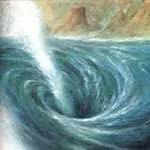There is war on Earth still, but despite his obvious self-destructive tendencies, Homo sapiens sapiens has managed to image Sagittarius A* through an international cooperative effort. The Event Horizon Telescope is an interconnection of eight radio telescopes that collected data for many hours to put together a cosmic collage of the supermassive black hole in the center of our Milky Way. The scientific team that capture this distant image is the same one that pictured the black hole in Messier 87 in 2019, so this picture is not the first of a black hole, but it is closer to home.
Physical proof of what was once only a theoretical object is a milestone in our species' immense journey. The achievement confirms Einstein's calculations of the black hole's size in his General Theory of Relativity--about the diameter of Mercury's orbit around our Sun. Roger Penrose, at the University of Oxford, received half of the 2020 Nobel prize for proving mathematically in 1964 that Einstein’s theory predicted the formation of black holes, even though Einstein himself didn’t think they existed. The other half of the prize went to Reinhard Genzel and Andre Ghez for the discovery of the Milky Way's black hole. Fortunately for us, the Milky's way central void does not consume interstellar gas at a high rate and is relatively stable, unlike M87's.
Our "gentle giant" as one scientist termed it, whirls endlessly irrespective of man's remote probing with his tools. Nothing--not even light--escapes a black hole's super-dense gravitational field. If a space explorer were to become captured like Odysseus threatened by the whirlpool of Charybdis, his vessel would spiral in to be crushed into elemental motes. Are black holes, thought to exist in the center of every galaxy, portals in space-time to other dimensions? No one knows. Emerson mused in his journal, "It is very unhappy, but too late to be helped, the discovery we have made that we exist. That discovery is called the Fall of Man. Ever afterwards we suspect our instruments. We have learned that we do not see directly." We have learned to ask the "terrible questions", said Emerson. Wisdom is the end of knowledge, not its beginning.

